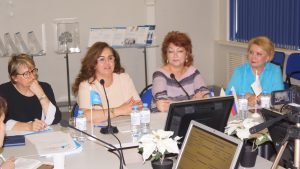
July 3, 2018 Bashkir Institute of Social Technologies – UNEVOC Center in the Russian Federation, hosted the International Forum which was dedicated to the implementation of the grant program “Transformation of Social Policy and Innovative Management in the Social Sphere”.
The participants came from a diverse pool of geographic locations: Russian cities (Balashov, Moscow, Nizhny Novgorod, Yaroslavl), the Republic of Bashkortostan, foreign countries – more than 100 people in total. Participants could attend the Forum in person and join online.
Franca Crestani, a representative of the European Training Foundation (Italy), Olga Oleinikova, Director of the Center for Studying the Problems of Vocational Education (Moscow), and Tanzilya Nigmatullina, Head of the UNEVOC Center in the Russian Federation based at BIST, Coordinator of the Turin Process in the Republic of Bashkortostan all spoke at the Forum. Representatives of local government, ministries and departments, educational organizations of the republic were in attendance.
Zulfiya Garifullina, Director of the Department of Social Policy of the Republic of Bashkortostan welcomed the participants on behalf of the Government of the Republic of Bashkortostan.
The following questions were discussed during the meeting: how to improve the quality of life, how to ensure stable development of the socio-economic sphere, how to solve problems of employment, how to support civil initiatives and ensure a successful dialogue between society and government. One of the solutions to these problems is to improve the quality of professional training of the individuals, who will be capable of responding to the challenges of the time, competent, responsible and ready to learn throughout life. The inclusion of the Republic of Bashkortostan in the Torino process is one of the promising steps in this direction.
This project was proposed by the European Training Foundation of the European Commission back in 2010. Its motto is – “Working together. Learning for life”, with the main goals of defining policies in the area of vocational education and training; providing analytical expert assessment of the development of vocational education in the participating countries; assisting in improving vocational education, project support; introducing innovative technologies and best teaching materials; discussing problems within a structured dialogue and developing specific recommendations and a common understanding of the medium-term perspective in terms of modern professional training.
In her speech, Tanzilya Nigmatullina focused on the activities of the UNEVOC Center in the Russian Federation, established at the Bashkir Institute of Social Technologies (the agreement on opening the Center was signed in 2011 by the UNESCO-UNEVOC International Center, Bonn, Germany; extended in 2016). Its mission reads: “Helping to protect and develop human resources for the socio-economic sphere” and the goal: “Building a model of vocational technical education that meets the requirements of the economy in the context of globalization, taking into account the best domestic and foreign experience, by combining pedagogical potential and social partnership with government agencies, public organizations and businesses based on the cluster approach”, match the goals of the Torino process. In addition, Tanzilya Nigmatullina presented the analysis of the condition on the system of vocational training in the Republic of Bashkortostan, conducted by the Agency of educational technologies at the UNEVOC centre.
Franca Crestani elaborated on the methodology of the Torino process, its goals, objectives and prospects. Her performance was completed by three films on the Torino Process.
Olga Oleinikova discussed the issues related to the implementation of the Torino Process in Russia, introduced the participants to the best practices, methods and technologies. She emphasized that the participation of Bashkortostan in this project will allow to use international experience to improve the quality of training of the graduates of secondary vocational educational institutions; attract employers and businesses, encourage implementation of national standards of quality, enhance mobility of graduates and, most importantly, portray the Republic of Bashkortostan as a region capable of promptly responding to the challenges of the current society.
The speeches raised great interest among the audience. Many questions were productively discussed. “The exchange of ideas was useful and interesting” – this was the general conclusion of both the organizers and participants of the forum. A collection of articles, based on the discussions will be published.

 July 4th, 2018
July 4th, 2018  ALINA B.
ALINA B.  Posted in
Posted in